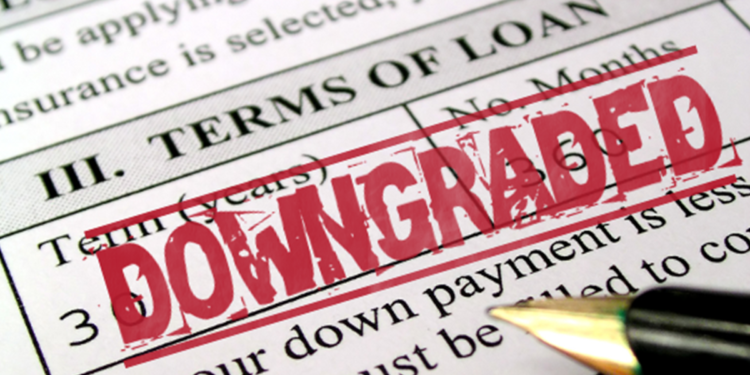E-levy to help address downgrade of Ghana’s credit rating – Finance Minister
Minister for Finance, Ken Ofori-Atta, has said the passage of the E-Levy Bill will help address issues of downgrading of Ghana’s credit rating from B to B- by rating agency Fitch Ratings.
This is because, the passage of the E-Levy Bill will serve as additional source of domestic revenue mobilisation for government and help meet rising government expenditure [one of the major factors for the country’s downgrade is insufficient domestic revenue mobilisation to meet rising expenditure].
Making the assertion at a press conference in Accra on Wednesday, January 19, 2022, the Minister noted E-Levy is a necessary tax tool to increase the country’s tax to GDP from circa 11.3% to 16%.
Adding that it would be the driving force to move the country towards a more sustainable debt level.
“Ladies and gentlemen the E-levy is a necessary tool to increase our tax to GDP from circa 11.13 % to 16% and above to guarantee that we pay for what we use,” he said.
For this reason he called on both sides of the House to look forward in joining hands to approve the e-levy on a consensus basis so that we collectively address the big issue of unemployment, debt sustainability, infrastructure and especially build our roads.
Speaking further, the Finance Minister noted the E-Levy Bill will be re-submitted to Parliament when it reconvenes on January 25, 2022.
Read: Passage of E-levy bill to ensure strong domestic revenue mobilization – Finance Minister
Ghana’s IDR downgraded from B to B-
Fitch Ratings has downgraded Ghana’s Long-Term Foreign-Currency Issuer Default Rating (IDR) from ‘B‘ from ‘B-’ with a negative outlook.
The downgrade of Ghana’s IDRs and Negative Outlook reflect the sovereign’s loss of access to international capital markets in the second-half of 2021, following a pandemic-related [COVID-19] surge in government debt.
The downgrade comes in the context of uncertainty about the government’s ability to stabilise debt and against a backdrop of tightening global financing conditions.
“In our view, Ghana’s ability to deliver on planned fiscal consolidation efforts could be hindered by the heavier reliance on domestic debt issuance with higher interest costs, in the context of an already exceptionally high interest expenditure to revenue ratio,” said Fitch.
Ghana’s effective loss of market access to international bond markets increases risks to its ability to meet medium-term financing needs.
According to Fitch, Ghana has sufficient liquidity and other available external financing options to cover near-term debt servicing without Eurobond issuance. However, there is a risk that non-resident investors in the local bond market could sell their holdings, particularly if confidence in the government’s fiscal consolidation strategy further weakens, placing downward pressure on its reserves.
Fitch assumes that Ghana will be unable to issue on international capital markets in 2022 and prospects for doing so in 2023 are uncertain. Ghana’s international reserve position has become highly reliant on annual Eurobond issuance.
Moreover, as of July 2021, non-resident investors held just below 20% (USD5.8 billion) of Ghana’s outstanding domestic government debt. While the maturity of these holdings is long-term, an outflow would put additional downward pressure on Ghana’s reserves.
Read below further details of Fitch’s downgrading of Ghana’s IDR
We forecast that Ghana will face approximately USD2.7 billion (3.3% of GDP) in sovereign external interest service and amortisation payments in 2022. We believe that the government can meet its external debt servicing without market access given its reserves, which we estimate at USD7.9 billion at end-2021 (3.2 months of current external payments). Reserves were bolstered by USD3 billion in Eurobonds in 2Q21, which helped the government to meet its approximately USD3.5 billion (4.7% of GDP) in sovereign external debt servicing costs last year, and by the USD1 billion IMF SDR allocations.
Fitch forecasts the general government fiscal cash deficit to narrow to 9.1% of GDP in 2022 from 15.1% in 2020 and 12.5% in 2021 (including 3% of GDP in domestic arrears clearance and payments related to the state-owned energy sector). The 2022 deficit would still be more than twice the 2022 ‘B’ median of 4.6% and risk to public finances remain high. The government envisages a deficit (including financial and energy sector support) of 7.4% in 2022 and 5.5% in 2023, with a fall to below the legal deficit ceiling of 5% in 2024.
The government’s fiscal consolidation plans are focused on revenue measures adopted in the 2022 budget, including a new 1.75% e-levy on certain digital transactions and changes to the calculation of certain taxes and import duties. The medium-term fiscal framework envisages that these new revenue measures, together with fading pandemic-related expenditure, will drive an increase in government revenue to 20.0% of GDP in 2022 from an estimated 15.4% in 2021.
Fitch believes that Ghana will achieve moderate medium-term fiscal consolidation, but that the government’s forecasts are overly optimistic. We forecast the fiscal deficit will narrow by significantly less, to 9.5% of GDP in 2022 and approximately 8.0% in 2023, as government revenue experiences a smaller increase. Ghana has struggled with earlier efforts to raise revenue/GDP and public finances were deteriorating even before the pandemic, albeit partly related to the clean-up in the financial and energy sector.
General government debt reached an estimated 83% of GDP at end-2021, including approximately 2% of GDP in debt held through the Energy Sector Levy Act special purpose vehicle. We forecast government debt to remain on an upward path through 2025, but expect debt to grow at a slower pace as the primary deficit narrows in 2022 and 2023. Debt affordability metrics will remain weak. Ghana’s debt constitutes 539% of government revenue, compared with the ‘B’ median of 325%. Interest payments were 44.6% of revenue in 2020 and the ratio is likely to continue rising through 2023, assuming a rising share of domestic debt in total debt in the absence of external financing options.
Given the slow pace of private sector credit growth and the weak asset quality environment, we expect that the domestic lenders will be able to meet the government’s increased reliance on domestic debt issuance. In 2020, the government placed GHS10 billion (2.7% of GDP) with the Bank of Ghana as an emergency measure. This measure could be repeated in response to additional shocks, but would carry risks to macroeconomic stability.
Ghana’s IDRs also reflect the following key rating drivers:
Fitch estimates that Ghana’s GDP growth accelerated to 4.7% in 2021 from 0.4% in 2020. We forecast growth to increase further to 5.5% in 2022, as the industrial sectors, including oil, recover in line with global growth recovery. Ghana experienced three years of strong growth prior to 2020, largely driven by increasing oil production. We expect oil production to increase to 190 thousand barrels per day (kbpd) in 2022, from an estimated 160 kbpd in 2021, but to remain flat through 2023, which will limit Ghana’s medium-term growth potential.
We expect post-pandemic growth recovery to keep GDP growth potential around 5%. The number of Covid-19 cases has increased dramatically in January, due to the Omicron wave, but hospitalisations and deaths remain below previous waves. Omicron is not likely to significantly impact 2022 growth. However, only 20% of Ghanaians have at least one vaccine dose. The low level of vaccination means that Covid-19 will continue to present risks to Ghana’s medium-term growth.
We forecast average annual inflation to decelerate slightly to 9.0% in 2022 after averaging 9.8% in 2021. Global supply chain issues fed through to domestic inflation, as did higher energy prices. The Bank of Ghana raised its main policy rate by 100bp to 14.5% in November 2021, reversing the 100bp cut that came in May. We envisage additional rate hikes in 2022, which could further exacerbate the government’s domestic debt interest costs.
Ghana’s external position will continue to be supported by a structural shift in the current account balance. We estimate that the current account deficit widened to 3.4% of GDP in 2021, from 3.2% in 2020, as imports recovered and exports remained flat on a nominal basis. An increase in gold and oil exports will help the current account deficit to narrow to 3.1% in 2022. Ghana’s current account deficit averaged 7% of GDP in the 10 years prior to 2017, when oil production reached significant levels. Fitch also expects that the overall external balance will improve as FDI increases in 2022 and 2023. Higher FDI flows and lower fiscal financing needs will help reduce Ghana’s overall external indebtedness. Fitch forecasts net external debt to fall to 25% of GDP in 2022 and further in 2021. The cedi remained broadly stable throughout 2020 and 2021.
ESG – Governance: Ghana has an ESG Relevance Score of ‘5[+]’ for both Political Stability and Rights and Rule of Law, Institutional and Regulatory Quality and Control of Corruption, as is the case for all sovereigns. These scores reflect the high weight that the World Bank Governance Indicators (WBGI) have in our proprietary Sovereign Rating Model. Ghana has a medium WBGI ranking at the 53rd percentile, reflecting a recent record of peaceful political transitions, a moderate level of rights for participation in the political process, moderate institutional capacity, established rule of law and a moderate level of corruption.
RATING SENSITIVITIES
Factors that could, individually or collectively, lead to negative rating action/downgrade:
– External Finances: A decline in international reserves sufficient to lead to increased financing stress that could arise as a result of a prolonged lack of access to international capital markets or from an outflow of non-resident investors from the domestic debt market.
– Public Finances: Further deterioration in fiscal liquidity conditions or signs of difficulty in meeting debt servicing costs, for example from a failure to source new external financing or from increased pressure on domestic debt markets.
Factors that could, individually or collectively, lead to positive rating action/upgrade:
– External Finances: A sustained resumption of the sovereign’s access to international capital markets, or a sustained improvement in Ghana’s external liquidity, such as an increase in international reserves occurring through non-debt-creating flows.
– Public Finances: Greater confidence in the government’s ability to source external financing, and/or place onto a downward path, public debt/GDP, for example, through the sustained implementation of a credible post-pandemic fiscal consolidation strategy.








